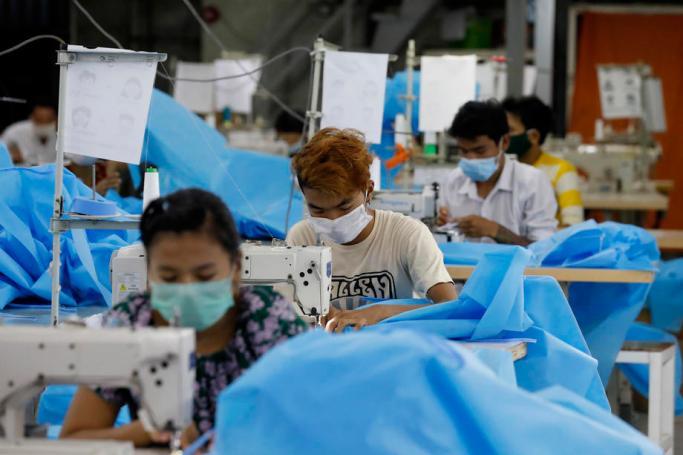A combination of the COVID-19 pandemic, which broke out in 2020, and the military coup in February this year have severely impacted the financial sector of Myanmar. The repercussion of these events will surely negatively affect the future of the country for years.
The COVID-19 restrictions caused serious problems for businesses and employment. But the military’s power grab that sparked the serious downturn. Ten months after the February coup, the financial situation in Myanmar is on the brink of collapse. While the country has suffered a decline in revenue sources, the State Administration Council of the junta has mainly depended on natural resources such as oil, natural gas and minerals, rather than taxes.
The junta council made a U-turn for the period of the country’s fiscal year between 1 April and 31 March, which was practiced from 1974 to 2019, revoking the term between 1 October and 30 September reformed by the National League for Democracy government in 2018.
The junta regime had drawn a mini budget for the 6-months period from 1 October 2021 to 31 March 2022 to preserve the income sources.
In some ways, the military junta inherited a sinking ship. As a result of the COVID-19 restrictions, the economy was in bad shape at the beginning of 2021. The International Monetary Fund has warned that the countries with lower potential of revenue and low vaccination coverage will struggle, noting the need for more flexibility with recovery programmes.
Development of financial and monetary resources and effective allocation of these sources were included in the economic sector of the COVID-19 Economic Recovery Plan (CERP) for 2019-2020 financial year. During this period, Myanmar received the financial assistance up to 1 per cent of GDP (not including relief items) from international donors.
In 2020-2021 FY, the budget expenditure of NLD government was 27.5 per cent of GDP (MMK 34.6 trillion). Revenue in this period was 22.1 per cent of GDP (MMK 27.85 trillion). Therefore, the net budget deficit was MMK 6.75 trillion or 5.4 per cent of GDP. In reviewing the budget of the previous government, it was found that Myanmar’s financial sector has weakened even before the February coup.
Most the regular expenditures in 2020-2021 FY were the loans from the World Bank, the Japan International Cooperation Agency and the Asia Development Bank. In addition to such international financial assistance, Myanmar was one of the 44 beneficiary countries of the Debt Service Suspension
Initiative (DSSI) from IMF. However, Myanmar spent only 1.7 per cent of GDP in 2020 to implement the work in CERP. This figure has proved the estimation of IMF that low-income countries spent less than 2 per cent of their GDP on the financial recovery plan in response to the pandemic.
Myanmar’s fiscal space had begun to suffer the serious impacts in 2020 when the pandemic spread. Banking and financial crisis after the February coup, as well as the third wave of COVID-19 has made the economic decline of the country worse. The weak economy of the country was further impacted by the coup. As a result of military coup, the Official Development Assistance partner organizations such as the World Bank, IMF, ADB and JICA suspended their loans and ongoing projects. The joint report of foreign business firms in Myanmar prepared in April has shown that the coup has hit all companies, regardless of whether they were local or foreign firms, and what is clear is the latter are pondering leaving the country unless the situation stabilizes.
Stability appears to be a dream. Not only are businesses and employment suffering. The civil disobedience movement of government employees from various departments was the initial blow of Myanmar’s economy and the refusal of people to pay electricity bill has cost billions of kyat for the military regime.
The exercise of new 6-months mini budget was likely to be an attempt of junta to implement a financial policy that can support economic development through more expenditure. It was estimated the total expenditure of MMK 18.14 trillion and income of MMK 12.58 trillion for the mini budget period.
Although the National Planning Department forecast the 3.8 percent increase in GDP in 6 months, the target is still realistic. Basically, the junta regime fixed the amount of its mini budget slightly higher than the half of 2020-2021 FY allocated by the NLD government. It might be a failed attempt of junta in trying to prove that the political crisis after coup has no impact on the country’s fiscal space.
The NLD government’s 6-months mini budget that was introduced on 1 October 2019 amounted to a total expenditure of MMK 10.547 trillion and total income of MMK 8.526 trillion, with an estimated deficit of MMK 2 trillion only. During this period, GDP growth was at a healthy 6 percent. But today the direction is negative.
The deficit of 6-months mini budget under the military regime is MMK 5.5 trillion up to now. To address this deficit, the junta is expected to make more money or printing more cash notes. It will then lead to inflation and further devaluation of the Myanmar currency.
It is impossible to increase the fiscal space of Myanmar economy without the contribution of international organizations. Unfortunately, the junta has lost the country’s access to various resources of funding including the special Drawing Rights of IMF amounted to US$650 billion. As it is estimated that Myanmar’s economy will shrink by over 18 percent in 2021, and the junta will not be able to rely on tax revenue.
The military junta will likely attempt to portray Myanmar’s economic situation in a positive light as the country enters 2022. But there is little doubt that the negative fallout of the COVID-19 restrictions and the coup will seriously hammer Myanmar’s financial and economic future.












